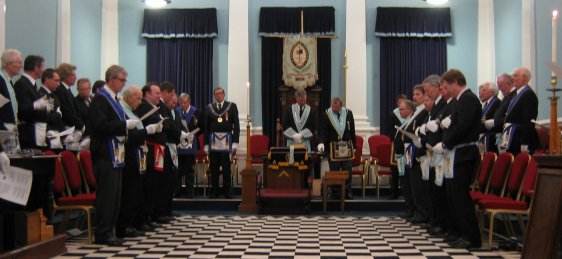|
|
Copthorne
Freemason's Lodge 5427 Established 1933 |
|
|
|
Home Charities Freemasonry Lodge History Joining Calendar What is Freemasonry? These notes and explanations below are taken from the Surrey Provincial Grand Lodge website. The United Grand Lodge of England has produced a booklet entitled "Are you thinking of becoming a Freemason?", which contains information about Freemasonry, there is also an introductory video to watch. Freemasonry is one of the world's oldest secular fraternal societies. This information is intended to explain Freemasonry as it is practiced under the United Grand Lodge of England, which administers Lodges of Freemasons in England and Wales and in many places overseas. The explanation may correct some misconceptions. Freemasonry is a society of men concerned with moral and spiritual values. Its members are taught its precepts by a series of ritual dramas, which follow ancient forms and use stonemasons' customs and tools as allegorical guides. The essential qualification for admission into and continuing membership is a belief in a Supreme Being. Membership is open to men of any race or religion who can fulfill this essential qualification and are of good repute. Please see the Declaration which must be signed by all candidates for membership. Freemasonry is not a religion, nor is it a substitute for religion. Its essential qualification opens it to men of many religions and it expects them to continue to follow their own faith. It does not allow religion to be discussed at its meetings. For many years Freemasons have followed three great principles:
Freemasons believe that these principles represent a way of achieving higher standards in life.
From its earliest days, Freemasonry has been concerned with the care of orphans, the sick and the aged. This work continues today. In addition, large sums are given to national and local charities. Freemasonry demands from its members a respect for the law of the country in which a man works and lives. Its principles do not in any way conflict with its members' duties as citizens, but should strengthen them in fulfilling their public and private responsibilities. The use by a Freemason of his member ship to promote his own or anyone else's business, professional or personal interests is condemned, and is contrary to the conditions on which he sought admission to Freemasonry. His duty as a citizen must always prevail over any obligation to other Freemasons, and any attempt to shield a Freemason who has acted dishonourably or unlawfully is contrary to this prime duty. All Freemasons are at liberty to acknowledge their membership and will do so in response to inquiries for respectable reasons. Its constitutions and rules, describing the aims and principles of Freemasonry are readily available to the public - though like many other societies, it regards some aspects of its internal affairs as private matters for its members. Freemasonry is non-political, and the discussion of politics at Masonic meetings is forbidden. Freemasonry is practiced under many independent Grand Lodges from other nations with standards similar to those set by the United Grand Lodge of England. There are some Grand Lodges and other apparently Masonic bodies which do not meet these standards, e.g. which do not require a belief in a Supreme Being, or which allow or encourage their members as such to participate in political matters. These Grand Lodges and bodies are not recognised by the United Grand Lodge of England as being Masonically regular, and Masonic contact with them is forbidden. A Freemason is encouraged to do his duty first to his God (by whatever name he is known) through his faith and religious practice; and then, without detriment to his family and those dependent on him, to his neighbour through charity and service. None of these ideas is exclusively Masonic, but all should be universally acceptable. Freemasons are expected to follow them.
|
The essential qualification for admission into and continuing membership is a belief in a Supreme Being Freemasons strive for truth, requiring high moral standards and aiming to achieve them in their own lives
The Square and Compasses is one of many symbols in Freemasonry that use operative stone-masons' tools to remind Freemasons of their moral duties and cares.
|





